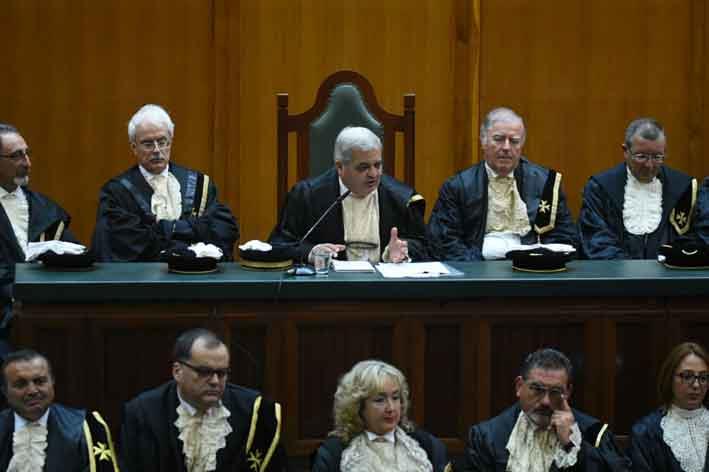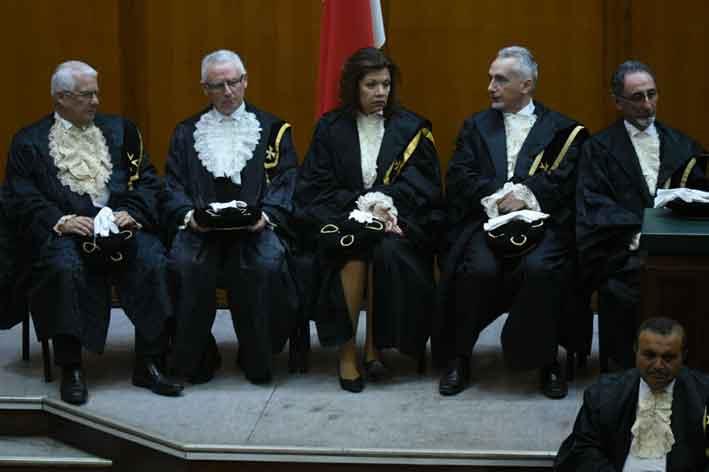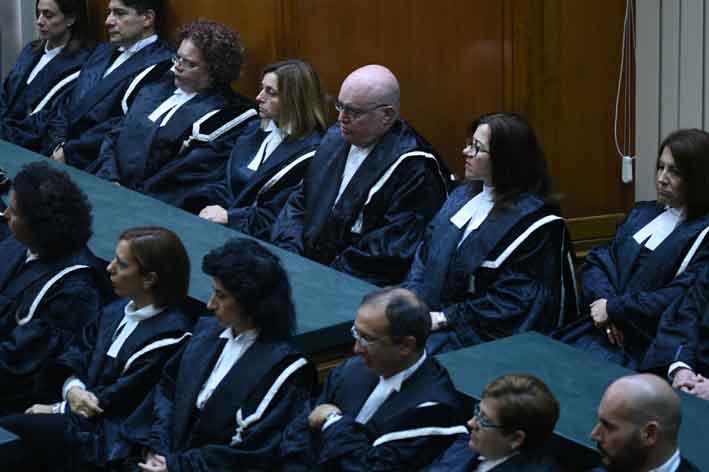Chief Justice Silvio Camilleri felt the need to “go back to basics” during this morning’s address where he spoke of the importance of safeguarding the rule of law, commenting that without proper law enforcement this cannot take place.
Addressing the opening of the Forensic Year, Camilleri said: “If the persons who occupy those positions fail to discharge their duties impartially and independently then the rule of law is undermined."
President of the Chamber of Advocates George Hyzler also delivered a strong speech, chastising the government for failing to conclude on the much awaited draft bill regulating lawyers. Hyzler announced that certain criteria which should have been imposed by this new law will be imposed by the chamber itself, which its members need to adhere to. The new rules have been put in place to strengthen credibility, transparency and ethical behaviour by lawyers.
Chief Justice Silvio Camilleri
Delivering his last speech as the Chief Justice as he will be retiring later this year, Camilleri said: “Today I believe that we need to go back to the basics in order that these are not forgotten and in order that we always keep in mind the very reason for the existence of the Judiciary and that which should motivate us as judges.”

He said that when the rule of law is not respected, the consequences are felt by the public facing obstacles on a day-to-day basis:
“The consequences will have to be borne by those pedestrians who cannot make use of the pavement because it is obstructed by tables and chairs contrary to law, by road users because of cars illegally parked and which obstruct the free circulation of traffic, by those who love the environment who have to submit to buildings constructed against the law and which render ugly the neighbourhood and obstruct light and air, by those ordinary citizens who seek enjoyment by the sea but find no room where they can stay because of deckchairs which unlawfully take up all available space. These are all consequences of the failure of the rule of law.”
Camilleri said that the rule of law requires certain qualities in order for its spirit to be respected, citing “non-discrimination, equality, proportionality and respect for human rights.
“A law which does not respect the principles to which I have referred is a law not in conformity with the rule of law but contributes towards the Rule of What is wrongful.”
He stressed this is just one aspect of the rule of law, and proceeded to speak at length about the second part: application and enforcement of the law.

“The rule of law cannot reign if the laws which are enacted, and which are precisely intended to fulfil that Rule, are not applied and enforced. The laws need to be enforced by those authorities vested with the power to enforce them.
“These authorities are not some abstract entities hidden in the clouds but consist of persons and therefore respect of the rule of law rests on the extent that these persons discharge their duties according to law and in conformity with the principles I mentioned of non-discrimination, proportionality, respect of the fundamental rights of the individual, and others.”
He went on to speak about the three pillars of law enforcement in Malta: the police, the Attorney General and the Courts.
Starting with the police force and moving on to the AG, Camilleri cited the law outlining their obligations. He stressed that if the police fail to carry out their duties, the AG will have nothing to work with when prosecuting somebody who is suspected of a crime.
“According to article 346(1) of the Criminal Code it is the duty of the Police to preserve public order and peace, to prevent and to detect and investigate offences, to collect evidence, whether against or in favour of the person suspected of having committed that offence, and to bring the offenders, whether principals or accomplices, before the judicial authorities. If this does not take place justice cannot take its course.

“The Attorney General then is vested with the authority to prosecute persons against whom evidence is produced. If the police, however, fail to look for, collect and preserve the evidence as required by law the Attorney General will have nothing on which to proceed. For certain serious offences the Attorney General was given cetain investigatory powers and where the police fails to act the responsibility therefore falls on him but if no action is taken then once again justice cannot take its course.”
Here he reminded the audience that police investigations do not only serve to confirm that a person has commit a crime, but also serves to exonerate individuals wrongly suspected of committing a crime.
Moving on to the final link of law enforcement, the Courts, Camilleri said that it “will never be in a position to discharge their duties and are deprived of their authority and rendered incapable of enforcing the law.”
“The procedure laid down by law for the implementation of the rule of law is a good and functional one, but presumes that the authorities on whom relies the entire procedure all carry out their duties without fear or favour.
“If there is punishment for some but not for others the Courts remain no longer administrators of justice but are transformed into administrators of injustice since they end up penalising some but not others. Instead of rule of law we will have the Rule of Delinquents.”

President of Chamber of Advocates George Hyzler
Hyzler delivered a scathing speech, mainly aimed at the government and the Minister for Justice who was present in the room, for taking 10 years and counting to conclude a law that will regulate the legal profession.
He announced that the Chamber of Advocates will be “gradually” implementing a number of measures that were supposed to be imposed through the bill regulating the profession of lawyers. Lawyers belonging to the Chamber of Advocates will be required to observe these rules, and failure to do so will result in suspension.
“I would like to remind you all that the Chamber is often asked to confirm that a lawyer is a member and is authorised to work as a lawyer. Naturally, certificates are not given to lawyers who are not members of the Chamber”.
He said that these measures are to be implemented in order to improve the respectability of the profession, which benefits the lawyers themselves as well as the public.
Media reports state that back in 2014, the government and the Chamber of Advocates did not agree on finer details of the draft bill, and one major bone of contention has been the Chamber’s request for it to issue warrants instead of the government.
He praised Justice Minister Owen Bonnici’s announcement of extra scrutiny through parliamentary committee for public appointments.

Judicial Appointments
Hyzler said that changes made in the previous year to the way that members of the judiciary are appointed was a step in the right direction but it did not go far enough.
A committee was set up for judicial appointments, however this committee can only say whether a government nominee satisfies the criteria at law to be appointed. The decision squarely belongs to the government “of the day”.
He criticised the current system were nominations are made by the government, and suggested that expressions of interest be produced for empty judicial posts. The current set-up does not allow for the government to get advice by those who have already evaluated possible contenders. Hyzler also said that without a call for expression people are being scared to put submit their name for evaluation because ultimately it is the Minister who decides on “criteria not strictly based on competence”.
Committee of Lawyers
Hyzler said that the committee of lawyers is unable to properly discipline lawyers not acting in line because of a serious lack of resources. He said that the committee is being devalued in this way, and instead of serving the public who raise complaints about lawyers, it is only serving to frustrate the public who are not seeing justice carried out after raising complaints.
Warrants
Onto warrant examinations for legal students, Hyzler pleaded for a revaluation to be carried out on the exam because students are being faced with confusion and uncertainty.
He called on warrant exams to be given a heavy dose of ethics, applicable for all lawyers – whether they wish to work in a courtroom or not. This would serve to ensure that new lawyers are credible, responsible and ethical.
Court Attorneys
Hyzler said it is unacceptable that there is no system to recuse a lawyer, drawing comparisons from the system of recusal for the judiciary.
He went on to say that the appointment of court attorneys, who present facts and evidence to the Judge/Magistrate so they may pass judgement, should pass through the same scrutiny that members of the judiciary go through – under the relevant committee. He suggested that court attorneys should not be appointed to positions of trust, but should be nominated after an expression of interest is released.